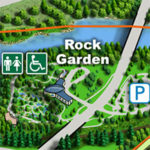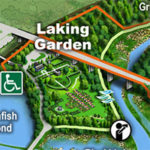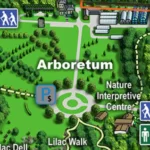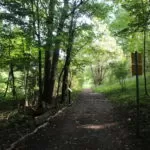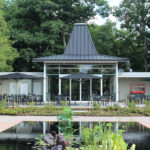| Membership | Price (+HST) |
|---|---|
| Single | $85/year |
| Single Plus | $120/year |
| Family | $130/year |
| Family Plus | $175/year |
| Contributing | $300/year |
| Supporting | $600/year |
| Sustaining | $1,000/year |
| Benefactor's Circle | $2,500/year |
| Director's Circle | $5,000/year |
| President's Circle | $10,000/year |
Royal Botanical Gardens and Earth Day at 50
Today is the 50th anniversary of the first Earth Day, held in the United States following on a 1969 declaration by UNESCO that the first day of spring (21 March) should be a day to honor peace and the environment.
The first celebrations were organized because people around the world were noticing serious problems with the way humanity interacted with the environment. By 1970 concern was high over the effects of air and water pollution, not just on human health but also on wildlife and plants. This concern was touched off in 1962 with the publication of Rachel Carson’s book Silent Spring, which raised the alarm about the effects of DDT and other pollutants on birds and other wildlife. That book touched off a rise of environmental consciousness throughout the 1960s and beyond.
Since the first Earth Day we have become more aware of a wider range of problems that our own activities are creating, from the loss of biological diversity to climate change. A greater awareness of the environment is particularly important in 2020 as we deal with the COVID-19 pandemic, an example of the rise of novel diseases linked to environmental degradation and the unsustainable use of biodiversity.
The Earth Day message of environmental education resonates strongly with our own story. Founded in the 1920s in part as a way to protect the sensitive wetlands of Cootes Paradise Marsh, our first educational programs were launched in the 1940s, and nature study has always been core to our mandate. Concern over the local environment was expressed early on. In the 1950s, Aleksander Tamsalu, RBG’s first botanist, mapped the distribution of aquatic plants in Cootes. He reported that pollution from surrounding urban development was degrading the wetland. By the time of the early recognition of Earth Day in Canada in the early the 1980s, Royal Botanical Gardens staff and volunteers were leading efforts to “clean up Cootes” in partnership with many others, work that continues to this day.
The celebration of Earth Day during the COVID-19 pandemic draws our attention in new ways to the interconnectedness of life. The physical distancing necessary to slow the spread of the virus has highlighted how much our own psychological well-being depends on interaction with others, not just with other people but with nature and the outdoors. From tending gardens and touching the soil, to enjoying trails and protecting nature, RBG is predicated on the fact that all life depends on plants, and we are not separate from that. Because of the absolute need to control the spread of the SARS-CoV-2 virus, it’s not possible to visit our gardens or hike on our trails at the moment, but this challenge will pass and we will once again be able to celebrate plants and nature in the coming months. This year more than any other, we need to carry forward the Earth Day message of celebrating nature, learning how we can live on earth with a lighter touch, and discovering the beauty and mystery of the world around us, throughout the entire year. We urge you to make every day Earth Day – collectively, we can make a world of difference.



